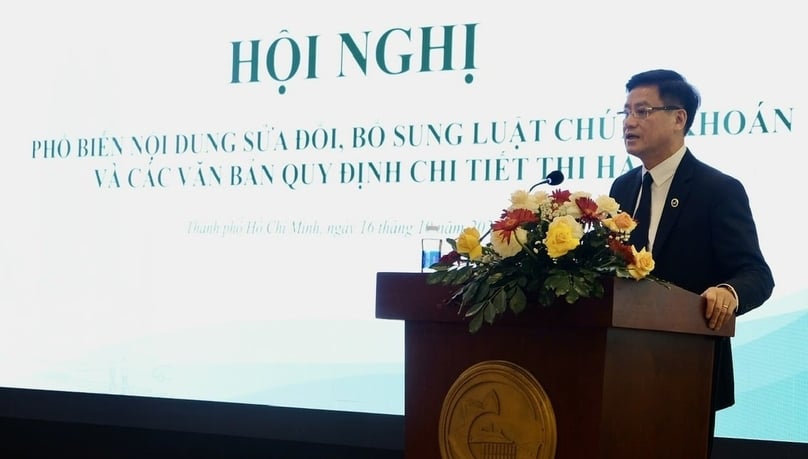By
Thai Ha
Sat, October 18, 2025 | 1:30 pm GMT+7
Vietnam’s stock market status will be upgraded by FTSE Russell from “frontier” to “secondary emerging” from September 21 next year, but continued reform is critical as the bigger challenge is to maintain the new classification, said a market watchdog official.
Maintaining the classification will need strong regulatory reform and active cooperation from market participants, said Hoang Van Thu, Vice Chairman of the State Securities Commission of Vietnam (SSC).
Thuy made the remark at the “Conference on Disseminating Amendments and Supplements to the Securities Law and Related Implementation Documents” held on Thursday in Ho Chi Minh City.
 Hoang Van Thu, Vice Chairman of the State Securities Commission of Vietnam (SSC), at the conference in HCMC, October 16, 2025. Photo courtesy of SSC.
Hoang Van Thu, Vice Chairman of the State Securities Commission of Vietnam (SSC), at the conference in HCMC, October 16, 2025. Photo courtesy of SSC.
The new market status classification is set to come into force on September 21 next year, subject to an interim review in March 2026, FTSE Russell stated in a release on October 8.
According to Thu, the SSC, stock exchanges, and the Vietnam Securities Depository (VSD) have been working hard on reforms to get the market better in line with international standards.
“To maintain the new classification, Vietnam must continue improving the legal framework, streamline processes, particularly settlement procedures, and, crucially, ensure the commitment and transparency of market participants, especially listed companies,” he stressed.
The Law No. 56/2024/QH15, recently promulgated, amends and supplements several laws under the Ministry of Finance’s management, including the Securities Law. To implement it, the Government issued Decree No. 245/2025/NĐ-CP, and the Ministry of Finance followed with Circular No. 19 governing public companies.
These new legal documents introduce groundbreaking provisions aimed at enhancing market transparency, increasing individual accountability, and facilitating access for investors and enterprises to the capital market.
Thu highlighted three major policy breakthroughs under the Law No. 56. He said the first group of policies seeks to enhance the transparency and efficiency in securities offerings. They align with the Government’s policy of raising the quality of securities listed on the market. “The goal is to enhance the quality of public companies participating in the market and improve the professionalism of public offerings.”
In the second group of policies, the law revises and improves regulations to strengthen market oversight, prevent fraudulent activities, protect investor rights, and build greater market confidence.
The third policy group aims to remove practical bottlenecks, simplify administrative procedures, and promote the upgrading and maintenance of Vietnam’s market classification.
According to Thu, Decree No. 245 and Circular No. 19 will remove many barriers, particularly those related to public company registration and the integration of IPOs with listing procedures.
He noted that Decree No. 245 eliminates many unnecessary administrative requirements and removes rules that duplicate information already available in other databases.
“With the spirit of reform embedded in Law No. 56, I hope this legal framework will soon take effect in practice and help Vietnam’s stock market develop sustainably, in line with the goals set by the Party and the Government,” he added.

